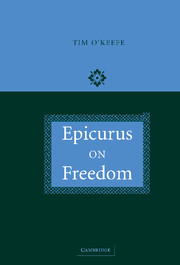Book contents
- Frontmatter
- Contents
- Acknowledgments
- List of abbreviations
- Introduction
- Chapter 1 What sort of an incompatibilist is Epicurus?
- Chapter 2 Lucretius on the swerve and voluntas
- Chapter 3 Aristotle and Epicurus on the origins of character and action
- Chapter 4 Epicurus' reductionist response to Democritean fatalism
- Chapter 5 The swerve and collisions
- Chapter 6 The swerve and fate
- Chapter 7 Epilogue: Epicurus and the invention of libertarian free will
- Appendix: Some texts
- References
- Index
Chapter 5 - The swerve and collisions
Published online by Cambridge University Press: 22 September 2009
- Frontmatter
- Contents
- Acknowledgments
- List of abbreviations
- Introduction
- Chapter 1 What sort of an incompatibilist is Epicurus?
- Chapter 2 Lucretius on the swerve and voluntas
- Chapter 3 Aristotle and Epicurus on the origins of character and action
- Chapter 4 Epicurus' reductionist response to Democritean fatalism
- Chapter 5 The swerve and collisions
- Chapter 6 The swerve and fate
- Chapter 7 Epilogue: Epicurus and the invention of libertarian free will
- Appendix: Some texts
- References
- Index
Summary
Before I turn to the role the swerve plays in preserving human freedom, I wish to consider the other reason Lucretius gives for why there must be an atomic swerve: without the swerve, there would be no atomic collisions, and thus no macroscopic bodies, as there evidently are. Compared to the extensive treatment of the anti‐fatalist function of the swerve, the ‘cosmogonic’ argument for the swerve has garnered relatively little attention. Most treatments of Epicureanism either paraphrase Lucretius' argument in De rerum natura without giving any extensive analysis of whether the argument is cogent or simply dismiss it as inadequate.
This disparity of attention is understandable. In connection with determinism, the swerve may ultimately be a mistake, but at least it opens up interesting questions about the relationship between causal determinism and free will. Lucretius' argument that the swerve is needed for atomic collisions, however, appears to rest on a simple misunderstanding – i.e., that there needs to be a start for collisions – and once this misunderstanding is pointed out, the argument has, at best, some minor historical interest. In this chapter, however, I want to rehabilitate the idea that Epicurus had good reasons to think that the swerve was needed as an archê of collisions, and that the swerve – in this connection, at least – was not simply a blunder or a misguided oversight.
This chapter contains five main sections.
- Type
- Chapter
- Information
- Epicurus on Freedom , pp. 110 - 122Publisher: Cambridge University PressPrint publication year: 2005



